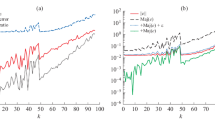A new method for obtaining computable estimates for the difference between exact solutions of elliptic variational inequalities and arbitrary functions in the respective energy space is suggested. The estimates are obtained by transforming the corresponding variational inequality without the use of variational duality arguments. These estimates are valid for any function in the energy class and contain no constants depending on the mesh used to find an approximate solution. This method for linear elliptic and parabolic problems was earlier suggested by the author. The guaranteed error bounds we derive can be of two types. Estimates of the first type contain only one global constant, which is a constant in the Friedrichs type inequality. Estimates of the second type are based on the decomposition of Ω into convex subdomains and the Payne–Weinberger inequalities for these subdomains. Bibliography: 20 titles.
Similar content being viewed by others
References
S. Repin, “A posteriori estimates for approximate solutions of variational problems with strongly convex functionals” [in Russian], Probl. Mat. Anal. 17, 199–226 (1997); English transl.: J. Math. Sci, (New York) 97, No. 4, 4311–4328 (1999).
S. Repin, “Two-sided estimates of deviation from exact solutions of uniformly elliptic equations” [in Russian], Tr. St-Peterbg. Mat. Obshch. 9, 148–179 (2001); English transl.: Transl., Ser. 2, Am. Math. Soc. 209, 143–171 (2003).
S. Repin, “A unified approach to a posteriori error estimation based on duality error majorants,” Math. Comput. Simulat. 50, 313–329 (1999).
S. Repin, “A posteriori error estimates for variational problems with uniformly convex functionals,” Math. Comput. 69(230), 481–500 (2000).
S. Repin, A Posteriori Estimates for Partial Differential Equations, Walter de Gruyter, Berlin (2008).
S. Repin, “Advanced forms of functional a posteriori estimates for elliptic problems,” Russ. J. Numer. Anal. Math. Model. 23, 505–521 (2008).
L. E. Payne and H. F. Weinberger, “An optimal Poincaré inequality for convex domains,” Arch. Rat. Mech. Anal. 5, 286–292 (1960).
G. Duvant and J.-L. Lions, Les inequations en mecanique et en physique, Dunod, Paris (1972).
A. Friedman, Variational Principles and Free-Boundary Problems, Wiley & Sons, New York (1982).
R. Glowinski, Numerical Methods for Nonlinear Variational Problems, Springer-Verlag, New-York (1982).
R. Glovinski, J.-L. Lions, and R. Trémolierès, Analyse numérique des inéquations variationnelles, Dunod, Paris, (1976).
W. Han and D. C. Reddy, “On the finite element method for mixed variational inequalities arising in elastoplasticity,” SIAM J. Numer. Anal. 32, 1776–1807 (1995).
R. S. Falk, “Error estimates for the approximation of a class of variational inequalities,” Math. Comput. 28, 963–971 (1974).
R. Kornhuber, “A posteriori error estimates for elliptic variational inequalities,” Comput. Math. Appl. 31, 49–60 (1996).
S. Repin, “Estimates of deviations from exact solutions of elliptic variational inequalities,” Zap. Nauchn. Semin. POMI 271, 188–203 (2000); English transl.: J. Math. Sci., New York 115, No. 6, 2811–2819 (2003).
P. Neittaanmäki and S. Repin, Reliable Methods for Computer Simulation, Error Control and a Posteriori Estimates, Elsevier, New York (2004).
M. Bildhauer, M. Fuchs, and S. Repin, “A posteriori error estimates for stationary slow flows of power-law fluids,” J. Non-Newtonian Fluid Mech. 142, 112–122 (2007).
M. Bildhauer, M. Fuchs, and S. Repin, “Duality based on posteriori error estimates for higher order variational inequalities with power growth functionals,” Ann. Acad. Sci. Fenn. Math. 33, No. 2, 475–490 (2008).
M. Fuchs and S. Repin, “Estimates for the deviation from the exact solutions of variational problems modeling certain classes of generalized Newtonian fluids,” Math. Meth. Appl. Sci. 29, 2225–2244 (2006).
S. Repin, “Functional a posteriori estimates for elliptic variational inequalities,” [in Russian], Zap. Nauchn. Semin. POMI 348, 147–164 (2007); English transl.: J. Math. Sci., New York 152, No. 5, 702–717 (2008).
Author information
Authors and Affiliations
Corresponding author
Additional information
Translated from Problems in Mathematical Analysis 39 February, 2009, pp. 81–90.
Rights and permissions
About this article
Cite this article
Repin, S.I. Estimates of deviations from exact solutions of variational inequalities based upon Payne–Weinberger inequality. J Math Sci 157, 874–884 (2009). https://doi.org/10.1007/s10958-009-9363-9
Received:
Published:
Issue Date:
DOI: https://doi.org/10.1007/s10958-009-9363-9



